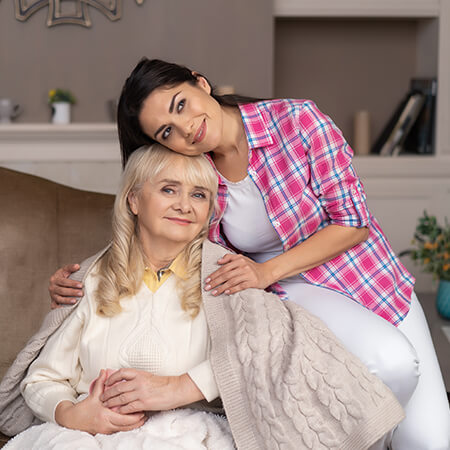


When a loved one is showing symptoms of Alzheimer's or an associated dementia, it can be a stressful time in your life. People diagnosed with cognitive damage need extra care to maintain their emotional and physical health. It helps to learn about the disease and enhance your knowledge about the best methods of dementia caregiving available for your loved one.
We allow your loved one with Alzheimer's to maintain the independence of their daily routine by providing them a comfortable atmosphere. Our devoted team provides compassionate care and high-quality service to your loved ones. The hallmark of our dementia care services are the values of dignity, integrity, and compassion. We live with our core values and passionately pursue the highest level of services for improving the patient's health and satisfaction.
Contact Us For Alzheimer's and Dementia Care for Seniors
Alzheimer's is a progressive brain disorder characterized by memory loss, cognitive decline, and behavioral changes. Symptoms increase over time and can severely impact a person's ability to perform daily tasks and activities.
Dementia is a medical condition that usually impacts older adults. The damaged brain cells are not able to effectively communicate with each other. Alzheimer's is the most common form of Dementia that accounts for nearly 60-80 percent of overall dementia patients. There are many types of Dementia, like Vascular Dementia, Mixed Dementia, Lewy Body Dementia (also referred to as LBD), etc.

People with Alzheimer's need high-level care to preserve and maintain their safety and well-being. Typically, family members care for their loved ones with early-stage and mid-stage Alzheimer's.
However, when a patient with Alzheimer’s progresses to the later stages, an assessment may be required. If the patient is diagnosed with Dementia, their well-being will depend on their family, friends, surroundings, and possibly family caregivers.
Professional care might be needed to help your loved one. While a nursing home is an option, hiring an alzheimer's home care service is more beneficial as they can continue to live with you at home and get customized care according to their needs and symptoms.

Caring for someone with Alzheimer's and Dementia can be overwhelming at times. We’re here to help you and your loved one. We provide superior quality in-home care for alzheimer's patients that include:
Our caregivers are trained and have real-world experience. We focus on encouraging what the patient can do rather than their perceived disabilities.

We offer an in-person assessment to see if Alzheimer's or Dementia home care is right for your loved one. We will start with an assessment in the comfort of your home, then make a personalized plan to meet the needs, symptoms, and preferences of your loved one. If you decide to proceed with our in-home care for elders with alzheimer's , we will provide a caregiver with skills and strengths particularly suited for your loved one. We seek to provide compassionate care to Alzheimer's and Dementia patients.
At Newport Home Care , we provide professional assistance for older adults with Alzheimer's and Dementia. Contact us today if you need an in-person assessment for your loved one.
Most symptoms, particularly early signs of Alzheimer’s, are perceived through a person’s behavior, thought pattern, and speech.
The most prominent Alzheimer's symptoms include:
The symptoms for Dementia include:
The most common types of dementia are listed below:
The exact cause of Alzheimer's is unknown; however, researchers have identified certain risk factors.
The three main risk factors are:
Other risk factors like sleeping problems or insomnia, high-stress level, smoking and drinking, trauma, and exposure to air pollution are also known to be responsible for Alzheimer's.
Currently, we do not have a cure for Alzheimer's . Although the progress of Alzheimer's is irreversible, modern treatment can slow the onset of disease, and delay the symptoms. Doctors recommend people with risk or having Alzheimer's to follow a healthy lifestyle and taking care of cardiovascular health. You can reduce the risk by increasing the intake of Omega-3 in your food, improving sleep habits, and reducing stress.
Excessive sleep is more common in the late stages of Alzheimer's, often due to the brain's deterioration.
Combativeness often occurs in the middle stages of Alzheimer's as the disease affects cognitive and emotional regulation.
Medicare may cover some home health services for dementia patients but not long-term care; eligibility depends on specific criteria.
The four R's of dementia care are Reassure, Redirect, Reminisce, and Routine, which help manage symptoms and provide comfort.
A dementia care plan outlines personalized care strategies tailored to the individual's needs, including medical, emotional, and daily living support.